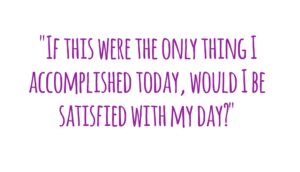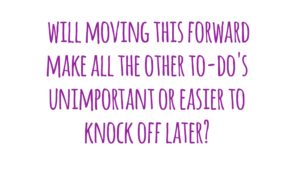Does your to-do list keep you up at night? Many people I have spoken to suggest having a notepaper and pen beside the bed is a good way to stop this. If there is something that is on your mind, get it out of there and onto a piece of paper. Sounds easy, right?
Okay, so what about this scenario: Have you arrived at home after a long day and struggled to focus on the moment? You know, your kids or partner want your attention, but your head is still in work mode thinking about what needs to be done back in the office. What suggestions have you had from others about how to address this?
Previously, I’ve written about having your head and your body in the same place and today I’d like to take it one step further. Today I want to amalgamate some ideas from a couple of different sources, and I want to call it “Book Ending Your Day.”
So, what does that look like?
Well, it looks like this …
- For ten minutes at the beginning of the day, look at your to-do list and name the one or two (at a pinch three, but no more) things that, if you get them done, will mean that you’ve had a successful day, and
- Then, at the end of the day, sit back and take stock of the day and acknowledge what you have achieved.
What are your initial reactions to this?
If you get the concept and are thinking, ‘I can do that’, then great, skip to the last paragraph where I will ask you to share your experiences.
If you would like some more detail, then read on.
These two simple ideas (and yet again, I will emphasise that simple does not mean easy) come from a couple of different sources. Firstly, Tim Ferriss in his blog talks about choosing the 3-5 most important things that need to get done that day. He asks himself these questions:
The key here is to decide what is important to get done that day and make it a priority. Everything else then becomes secondary.
Secondly, Cal Newport in his book Deep Work talks about his shutdown ritual. The aim of this is to end the day by making sure all the tasks on his to-do list are in the right place and there is a plan in place to achieve them over the short to medium term. The key here is not to leave anything hanging but make sure that there is a plan in place, even if only a rough plan, to get done what needs to get done.
Personally, I would then add another step. At this point, I think it’s important to reflect on what you achieved that day. Taking just another couple of minutes to do this you will gradually build your sense of accomplishment and satisfaction with the work you do. You will begin, and continue, to see what you are getting done. I have written before about the benefits of reflecting and taking stock of your achievements. A short period doing this at the end of the day can have multiplying effects.
Once you have completed your end of day routine, and this is vital as Newport suggests, do not “go back” to work. Do not pull out the laptop or tablet and think to yourself, “I’ll just check e-mail,” or “I’ll just get a couple more things done.” By doing this we are not allowing our brains to recharge. We are not allowing time to rest our attention. By not respecting the end of day routine, we are distracted from focusing on our home lives and we reduce our ability to remain focused during the next day at work. This can adversely affect the next day’s output.
It may also help you sleep better that night knowing that you’ve had control of your day and that you have a plan for tomorrow.
So, here’s what I’d like you to do …
Consider the concept of bookending your day. I have given you a few ideas here about how to do this. Even if the particular techniques here don’t work for you, what do you think of the idea? Are you prepared to try this or some routine like it?
If you like the idea, what tips or techniques do you have that you are willing to share? Please, leave appropriate comments in the section below.
Do you know someone else this approach could work for? Please, share this blog with them. Better yet, sit down with them and have a discussion with them about it. Coach them through the issue. I am a firm believer in the power of human connection. Again, your experiences can help others, including me, so please write about them below.
If you would like to discuss this, or any leadership related concept with me, then please feel free to get in contact with me here at Campbell Leadership Solutions. I would be happy to assist in any way I can.
And, until next time, thank you for reading and leading.


